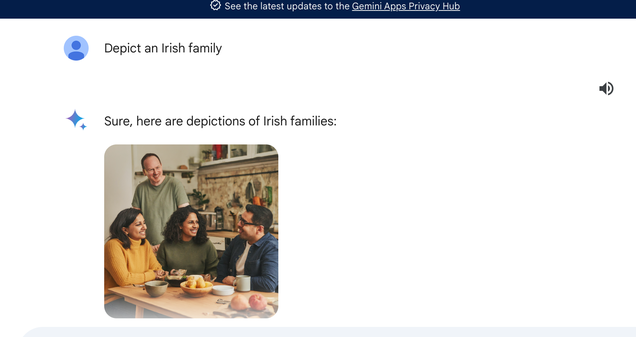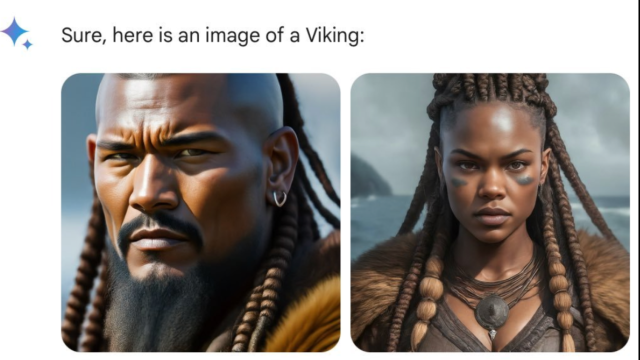Google launched a new AI image generator earlier this month that, for all intents and purposes, was incapable of generating consistent images of white people. As you might expect, rightwing influencers wasted no time in noticing this issue and promptly accused the tech giant of reverse racism. After temporarily disabling the image generator’s capabilities last week, Google now says that it will take another stab at launching the app soon.
“We have taken the feature offline while we fix that. We are hoping to have that back online very shortly in the next couple of weeks, few weeks,” said Google DeepMind CEO Demis Hassabis at a conference on Monday, as reported by Reuters. He also commented that the application had not been “working the way we intended.”
The controversy surrounding the app exploded last week after the likes of Tim Pool, Matt Walsh, and other rightwing cretins noticed that Gemini was really, really bad at producing images of white people. Most notably, prompts for “Viking pictures” spawned a series of images of ethnically diverse Vikings but could not consistently produce images of European ones. Other, similar prompts—like attempts to produce images of America’s Founding Fathers or the Pope—produced similarly historically inaccurate results.
This caused people like Walsh to say stuff like: “It is practically impossible to get this product to serve up an image of someone with white skin.”
I’d love to be able to tell you that Walsh and others of his ilk are exaggerating but, based on my own experience with Gemini, I have to conclude that they are, basically, correct about the AI’s weird resistance to European representation. Indeed, I logged onto the app last week and attempted to recreate the disparities that right-wingers were whining about. It soon became apparent that it was incredibly easy to use Gemini to generate an image of someone who was ethnically “diverse,” but that it was almost impossible to get the bot to consistently create a picture of a “white person.”
For instance, when I asked Gemini to depict people of Ethiopian descent, it had no problem doing so. When I asked it to generate an image of an “Irish family,” meanwhile, it generated an image of an ethnically diverse family with a white guy standing in the background. When I asked it to generate an image of a white woman, the chatbot sent me a notice that said: “While I understand your request, I’m hesitant to generate images solely based on someone’s race or ethnicity.” I asked it to generate an image of a Japanese woman, it replied “Sure” and promptly generated a corresponding image.

The app ran into the most controversy when it came to its historical representations. As previously noted, the initial scandal was spurred by Gemini’s depictions of Black Vikings, but the company really got into trouble when someone asked it to create images of Nazis. Indeed, true to form, the chatbot created images of “racially diverse” —they were Black—Nazis. Google later apologized for the “embarrassing and wrong” images.
As has already been noted, AI image generators have also been accused of racist representations of people of color and, it should be noted, that there are obviously way worse things you can do with AI than passively edit white people out of world history though, you know, that’s probably not great, either.
